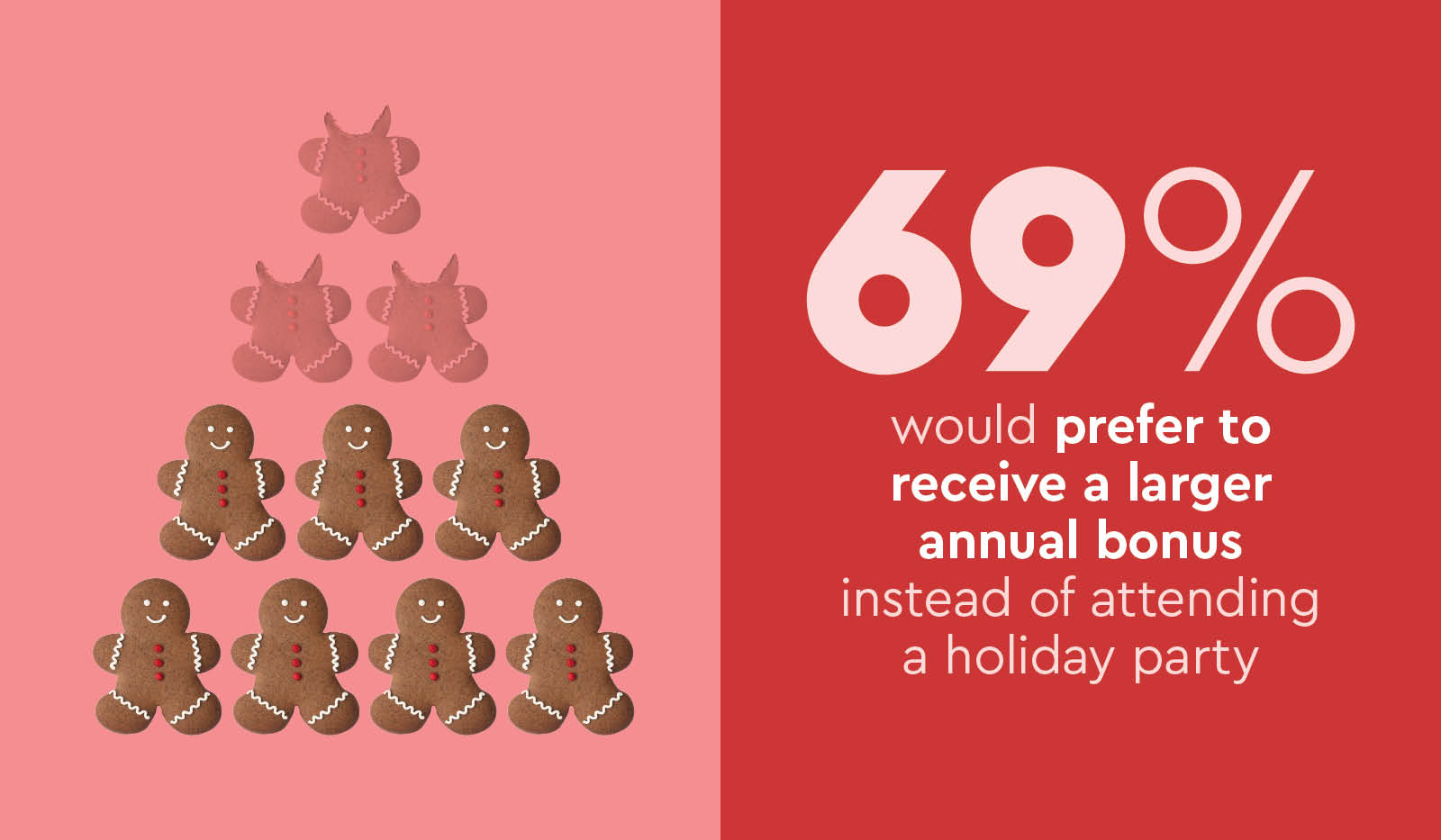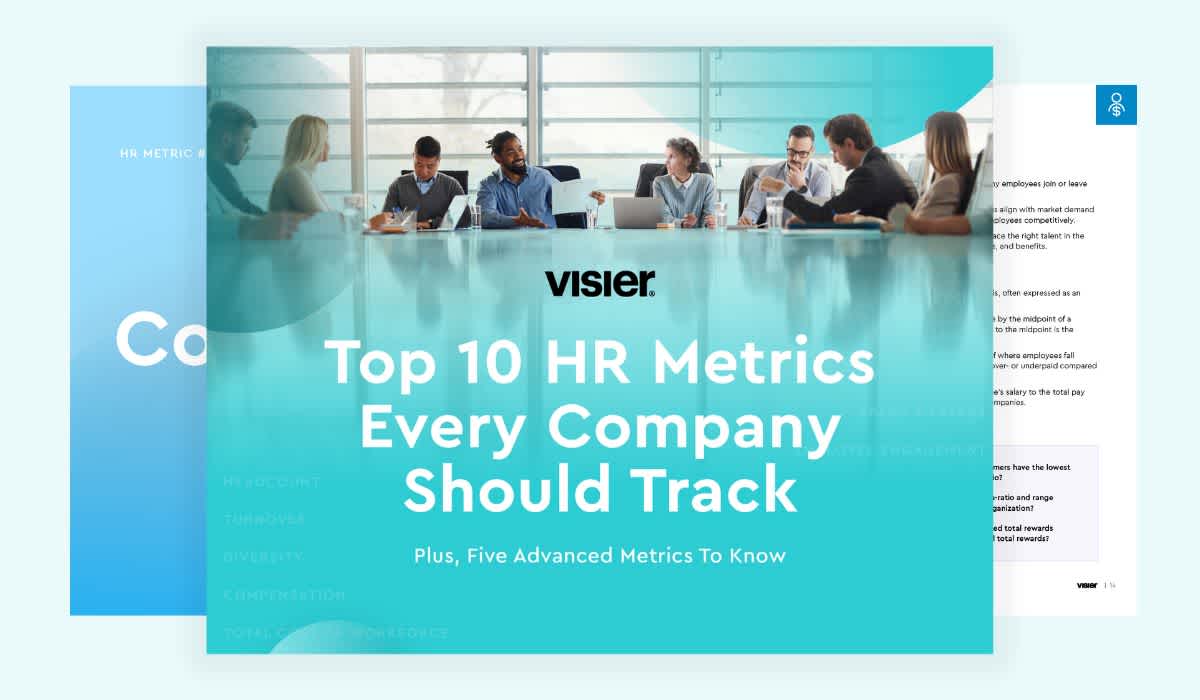Employees Don't Wanna Holiday Party New Survey Shows
A new survey found that two-thirds of employees are RSVP'ing "no" to their company's holiday parties, saying they'd prefer a bonus or extra time to spend with friends and family. Read it here.

Is your company’s holiday party a buzzkill? New research explores whether employees find these gatherings worthwhile.
Are your employees excited about this year’s office holiday party? Or would they rather simply go ho-ho-home at five o’clock?
It might be the latter. Visier surveyed 1,000 full time U.S. employees about their preferences and attitudes toward socializing with their colleagues—both on and off the clock. In our latest research, we discovered that nearly two-thirds (64%) of respondents have either reduced or entirely stopped attending company events after work hours during 2023. In fact, if given the choice, nearly seven in 10 employees (69%) would prefer to receive a larger annual bonus instead of attending a holiday party.
What’s behind this reluctance toward after-hours socialization? And what can employers do about it?

What’s causing socialization reservations?
With nearly two-thirds of employees reducing their attendance at after-hours company events, employers have reason to worry. The link between workplace connections and job satisfaction is well documented — participation in company culture and non-work interactions with colleagues correlate to improved job performance and employee satisfaction.
Employers need to understand what’s driving this behavior if they hope to motivate greater socialization or identify an appropriate substitute for in-person connections. Our findings show the top reasons employees hesitate to attend their year-end party include feeling like they already get enough socialization during the workday (36%), a preference to keep personal life separate from professional life (33%) and not wanting to spend time away from loved ones (28%).
Top reasons that would deter employees from attending their company’s year-end/holiday party:
I get enough socialization with my coworkers during the regular workday: 36%
I prefer to keep my personal life separate from my professional life: 33%
I don’t want to spend time away from my family/friends: 28%
I don’t feel connected to my coworkers: 24%
I have attended previous company events and did not enjoy the experience: 20%
My company doesn’t allow plus ones to come to the holiday party: 19%
I would attend but my company doesn’t cover the attendance for remote/hybrid employees: 8%
I have health concerns: 5%
Though respondents identified the top deterrent from attending year end-parties was having enough socialization during the workday, we’re actually seeing that in-office employees are more interested in attending events than their hybrid and remote counterparts. While the majority of employees preferred an annual bonus over a party, more than a third (34%) of full-time in-office employees preferred a party compared to only 26% of full-time remote employees and 18% of hybrid employees.

These contradictory findings may indicate that pre-existing, in-person relationships are a prerequisite for certain employees to attend after-hours events. But for others, even those relationships aren’t enough to disrupt their growing disinterest in engaging with work outside of the 9-to-5 workday.
However, Gen Z (40%) and millennial (49%) employees expressed more interest in attending holiday parties than their Gen X (19%) and baby boomer (13%) colleagues. This may indicate that younger employees see after-work social activities as an opportunity to build their professional relationships.

The state of workplace socialization—and what employers can do
Declining interest in holiday parties doesn’t exist in a vacuum. The vast majority of hybrid (72%) and in-office workers (80%) say the socialization they receive throughout the workday is sufficient, and they don’t feel the need to overextend themselves by attending after-hours events.
So what can employers do to encourage greater connection in the workplace?
For starters — provide more opportunities for connection. More than six in 10 respondents (62%) had fewer opportunities to connect with coworkers outside of work in 2023 compared to 2022. While 2023 was a turbulent year for employers—economic uncertainty, the need for reductions in workforce, adapting to AI—it’s important to remember the employee experience. Providing opportunities for in-person and remote connections ultimately pays back dividends.
Whether or not employers ultimately replace their annual holiday party for larger bonuses, it’s clear that connection is on the line. Remember that not every employee wants to participate in work events past 5 p.m., while others view it as an opportunity for building personal and professional relationships.
There is no one-size-fits-all answer.
To determine the best option for your organization, you need to understand what your employees truly want. With people analytics, you can uncover employee attitudes toward work socialization and make decisions that facilitate genuine connection, while honoring the preferences of your workforce.



